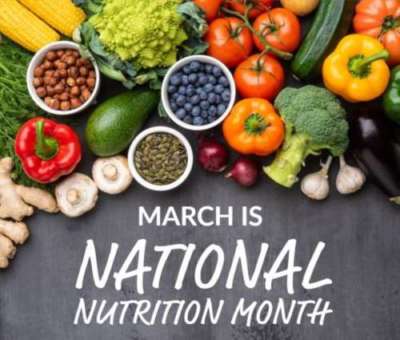
Did you know that one in five deaths globally — equivalent to 11 million deaths — are associated with poor diet? And did you also know that diet contributes to a range of chronic diseases in people around the world? In the US, chronic diseases are rampant and there are many contributing factors, but the biggest is diet. We are, collectively, one of the sickest countries in the world. But there is always room for improvement and everybody is capable of change.
National Nutrition Month has been going on since 1973, when it began as a one week event, marked by a presidential proclamation with the theme “Invest in Yourself – Buy Nutrition”. By 1980, interest in nutrition had grown so much that the Academy of Nutrition and Dietetics decided it was time to expand and adopted March as National Nutrition Month.
How does this event play into your daily life? Well, it’s a reminder that we all need to be more conscious of the foods that we ingest because those foods can either feed disease or prevent it. In the US, dietary-related diseases, such as diabetes, heart disease, obesity, strokes and cancer are just some of the top 10 reasons people die earlier than expected. And almost all of these types of diseases can be prevented or treated with proper nutrition. So, let’s look at some things you can do on a daily basis to help improve your health through your diet.
Make Calories Count
Counting calories is not a healthy way to live your life. But the quality of those calories is very important. Think nutrient rich instead of good or bad foods. Most food choices should be packed with vitamins, minerals, fiber and other nutrients. Be aware of portion sizes. Even low-calorie foods can add up when portions are larger than you need.
Variety is the Spice of Life
1. Fruits and vegetables should be the basis of a healthy diet. They are healthiest when they are fresh or frozen. Look for locally grown produce that’s in season. Fruits and vegetables should make up half your plate at every meal to keep your body functioning at an optimal level.
2. Vary your protein choices with more beans, tofu, lentils, oats, nuts, nut butters and peas. And if you don’t have a gluten sensitivity, give seitan a try. Protein requirements vary, but a general goal is a quarter of your plate per meal.
3. Next, whole grains like brown rice, quinoa and barley should also be part of a healthy daily diet. The general goal for grains is also a quarter of your plate per meal.
4. Lastly, you need healthy fats. Yes, fats have been demonized, just like sugar, but your body actually needs both to function (in the proper form and quantities). Healthy fats can be found in items like avocados, nuts, seeds and coconut. In fact, an avocado a day will give your body all the healthy fats it needs to function well.
Mindful Eating
When it comes to meal time, make time. Turn off all distractions, including cell phones and savor your meal. When you mindfully eat, your body is more open to receiving the nutrients because your digestion isn’t being rushed and forced.
Limit Dairy and Meat
There are tons of studies available that confirm that overconsumption of meat and dairy are contributing factors to many dietary related diseases. Find ways to either eliminate or replace some of these items at meal time. There are many plant-based dairy products available now, so that is one option. When it comes to meat, red meat is the version that is related to most diseases. But all meat can contribute to elevated cholesterol, heart disease, stroke and cancer. Try cutting your portions of meat in half and notice how your body feels. You might be surprised.
Challenge yourself to actively participate in National Nutrition Month. Get the whole family involved. Try new recipes and foods, prep and cook a meal together, get started on a garden for the summer months or maybe take a cooking class. There are lots of ways to eat a cleaner diet and still enjoy your food. There’s really nothing to lose, except maybe a few pounds. And who knows? You might discover a new way of living that helps keep you free from disease. The sky is the limit!

